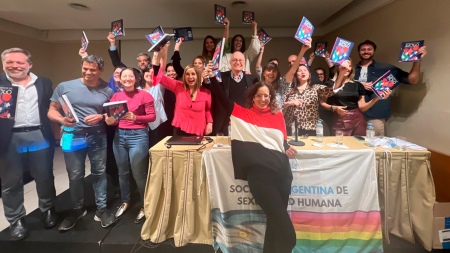“Let’s talk about sex.” It sounds like the name of a late-night adult show, but it’s the title that the Argentine Society of Human Sexuality (SASH) put to a disclosure text that brings together in a pleasant and attractive format different views on a topic that passionate and disturbs Argentines: sex.
The different chapters were written by specialists from the entity and explore topics as dissimilar as the first time, robotics at the service of sexuality, the history of sex toys, relationships after menopause and sexual activity during pregnancy.
Although it was presented at the SASH conference held in August at the Hotel Conquistador in the City of Buenos Aires, the book is not intended for specialists but for anyone interested in the subject out of mere curiosity or a desire to improve their sex life. “Our goal is not to earn money but to spread these issues from the perspective of specialists in the subject, whether they are doctors or psychologists. That is why the book is freely available for downloading on the Society’s website”, points out Dr. Silvina Valente, president of SASH.
valente is physician, clinical sexologist and specialist in gynecology and obstetrics and noticed that during the isolation caused by the coronavirus, the demand for sexology consultations grew. “In a pandemic, inquiries rose 200%. People wanted a change in their life and also in their sexuality. Sexuality is life and the pandemic is death”, analyzes the specialist who attends in a private office together with a team of specialists but also in the interdisciplinary (and free) service of the Hospital de Clínicas.

With the experience of having made a book for adults to talk about sex with children –“The superpower of sex education”-Valente orchestrated a publication during isolation so that different specialists would each write a chapter addressing a topic that emerged from the consultations: “In all cases, without losing the scientific perspective, we looked for a magazine format, with boxes and exploded views that would make it attractive the reading”.
To transform their wisdom into accessible material for all ages and the most diverse backgrounds, the specialists had a great ally: the journalist Victoria Cherquis which dealt with the editing of texts and their “translation” from scientific language to a more everyday one.
“The proposal seemed fun to me but later I realized that it was a tremendous challenge. My job was to be “the ham of the sandwich” where the bread from above was scientific-medical-psychological knowledge… and the bread from below was the general public”, he describes and then points out the importance of the topic that goes “from the scientific to the morbid”. “Nobody resists wanting to know, read or see what follows after the word ‘sex'”he concludes.
“80% of young people educate themselves sexually with pornography,” says Dr. Silvina Valente, president of the SASH
“The semantic limit of the word sexuality widens and expands as soon as we try to define it: And when we want to realize it, we have touched matters related to marriage, family, women, instincts, chastityhysteria, love, eroticism, obscenity, modesty, frigidity, courtship, betrayal, friendship, menopause, celibacy, adultery, pleasure, pornography, orgies, transmission diseases sexual, pregnancies, masturbation, hormones, impotence, homosexuality, transsexuality, phobias and affiliations and a long etcetera”, synthesizes Cherquis.
Then it is Valente, who lists the topics that “jumped” from the consulting rooms to the pages of the book: “There are issues that are not discussed and arise in the consultation at the hospital or office, such as masturbation or sex in old age. Masturbation went from being a sin to being an obligation and sometimes it is put on display and is not treated with the seriousness with which it should be treated”.

The sexologist also points out that “80% of young people educate themselves sexually with pornography. Videos and movies reproduce the clichés of patriarchy, turn women and men into sexual objects, and generate dissatisfaction and frustration. There are men who believe they are premature ejaculators if they ejaculate within 19 minutes of continuous vaginal intercourse. like in the movie they saw”, he describes.
The sexologist also explains that the book tries to argue that sexuality is not only genitality and that can be adapted to the characteristics of the couples. “Not everything is penetration. There are prostate operated men who cannot have erections, and women who feel pain when penetrated. Sexuality has to transcend genitality”, he proposes and points out that courtship and seduction exist in human beings since there is a choice.
According to legend, Cleopatra VII was the first to develop a vibrator for erotic purposes.
Reviewing the issues that bring his patients to the consultation, Valente points out that the reasons vary according to age: young men are concerned about their performance, women want to ejaculate, when statistics indicate that only 3% have glands capable of producing some liquid and that cannot be controlled, and men seek to have better performance. They all want to check if their sexuality is normal and they arrive anxious. The worst is anxiety is the enemy of sex. Sometimes you compare yourself with what you see, with the show off that is far from reality”.
LET’S TALK ABOUT SEX by Telem Web on Scribd
From the SASH they define the sexology as a medical specialty but trying to impose itself. “We are making a path. At the moment only one prepaid medicine company, Osde, covers consultations of this type”, says its president.
Among the most attractive themes of the book is the history of sex toys Dr. Adriel Hudson does, who says that the first known object of this type is “the Tubingen phallus”, a carved and polished stone object, with a sharp point, 20 centimeters by three that dates from 28 thousand years ago and that, according to legend, Cleopatra VII was the first to develop a vibrator for erotic purposes.
“Robotics is a tool to use in sexuality, as technology the risk would be to use it because we cannot bond with another person, or not,” Valente concludes.



















